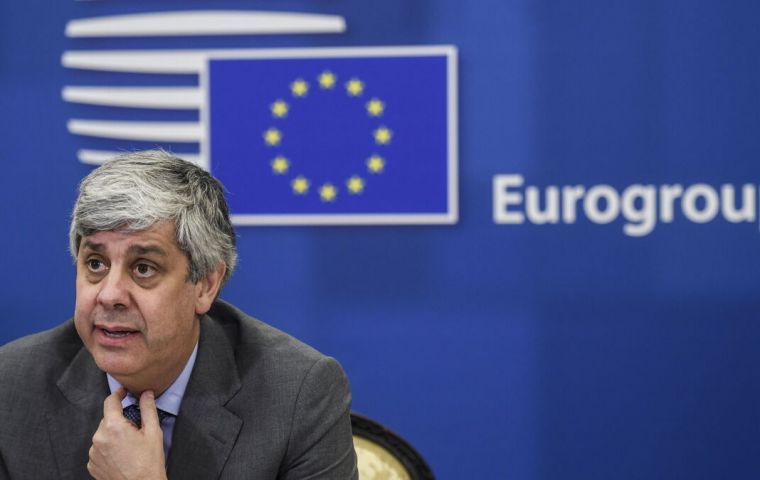MercoPress. South Atlantic News Agency
EU agrees massive emergency Euros 500bn fund; Germany says “nein” to mutual guaranteed coronabonds
 “These are bold and ambitious proposals”, said Mr Mario Centeno, Portugal's finance minister who chairs the Eurogroup
“These are bold and ambitious proposals”, said Mr Mario Centeno, Portugal's finance minister who chairs the Eurogroup European Union finance ministers have agreed on a massive emergency package designed to ensure that member-states hit hard by the coronavirus pandemic will have the necessary resources to rebuild their economies.
After a week of intensive diplomatic haggling culminating in one of the longest-running ministerial sessions on record, finance ministers of the Eurogroup composed of all the countries operating the Euro as their single currency agreed on an economic rescue package which could ultimately be worth around 500 billion euro of credits to provide national economies with enough resilience to meet the health emergency.
“These are bold and ambitious proposals”, said Mr Mario Centeno, Portugal's finance minister who chairs the Eurogroup. “We can all remember the response to the financial crisis of the last decade, when Europe did too little too late. This time around is different.”
But as is often the case with EU financial initiatives, headline figures disguise plenty of caveats, and the package still skirts around the biggest question: whether EU member-states are ready to guarantee each other's debt liabilities.
Under existing EU arrangements, countries with the euro must adhere to strict conditions on, among others, how much national debt they can have and how big the deficit in their annual budget can be.
Certain European states - such as Italy, France or Spain - have always struggled with meeting these conditions while Greece faced bankruptcy a decade ago because it was no longer able to service its national debt.
In order to avoid similar crises the EU established the European Stability Mechanism (ESM), which acts as a permanent “firewall” against future financial panics by providing readily-available cash to stave off national bankruptcies.
The snag, however, is that ESM money is only available with strict conditions which force a state borrowing to undertake painful austerity measures in order to bring its finances back in line with EU obligations.
And that is something that is virtually impossible for countries such as Italy, which already has a national debt equivalent to 134% of GDP, double what is permitted under European rules, and may end this year with a total debt of 180% of GDP because of emergency spending on the coronavirus pandemic.
As a result, a group of countries led by Italy and France have proposed that the EU should consider issuing joint debt - dubbed “Coronabonds” - which would be guaranteed by all member-states, including Germany, Europe's biggest economic power.
Unsurprisingly, Germany, the Netherlands and a few other rich northern European states have rejected this request, pointing out that mutual debts are explicitly banned under existing treaties.
The latest rescue deal is a compromise which provides needy European countries with some economic relief while keeping the bigger debate about mutual debt unresolved.
Any Eurozone country can now borrow from the ESM without any political conditions but only in order to cover immediate medical expenses and provided such “unrestricted” funds do not amount to more than 2 per cent of a country's GDP.
A separate 100 billion euro unemployment insurance scheme is to be established, with the objective of helping countries cope with the aftermath of the health crisis.
And a further 200 billion euro of borrowing will be made available by the ESM for countries whose economies are affected by the coronavirus, although all this will still be based on the condition that these countries tighten their economic belts.
The deal “marks a great day for European solidarity and strength”, claimed German Finance Minister Olaf Scholz.




Top Comments
Disclaimer & comment rulesCommenting for this story is now closed.
If you have a Facebook account, become a fan and comment on our Facebook Page!